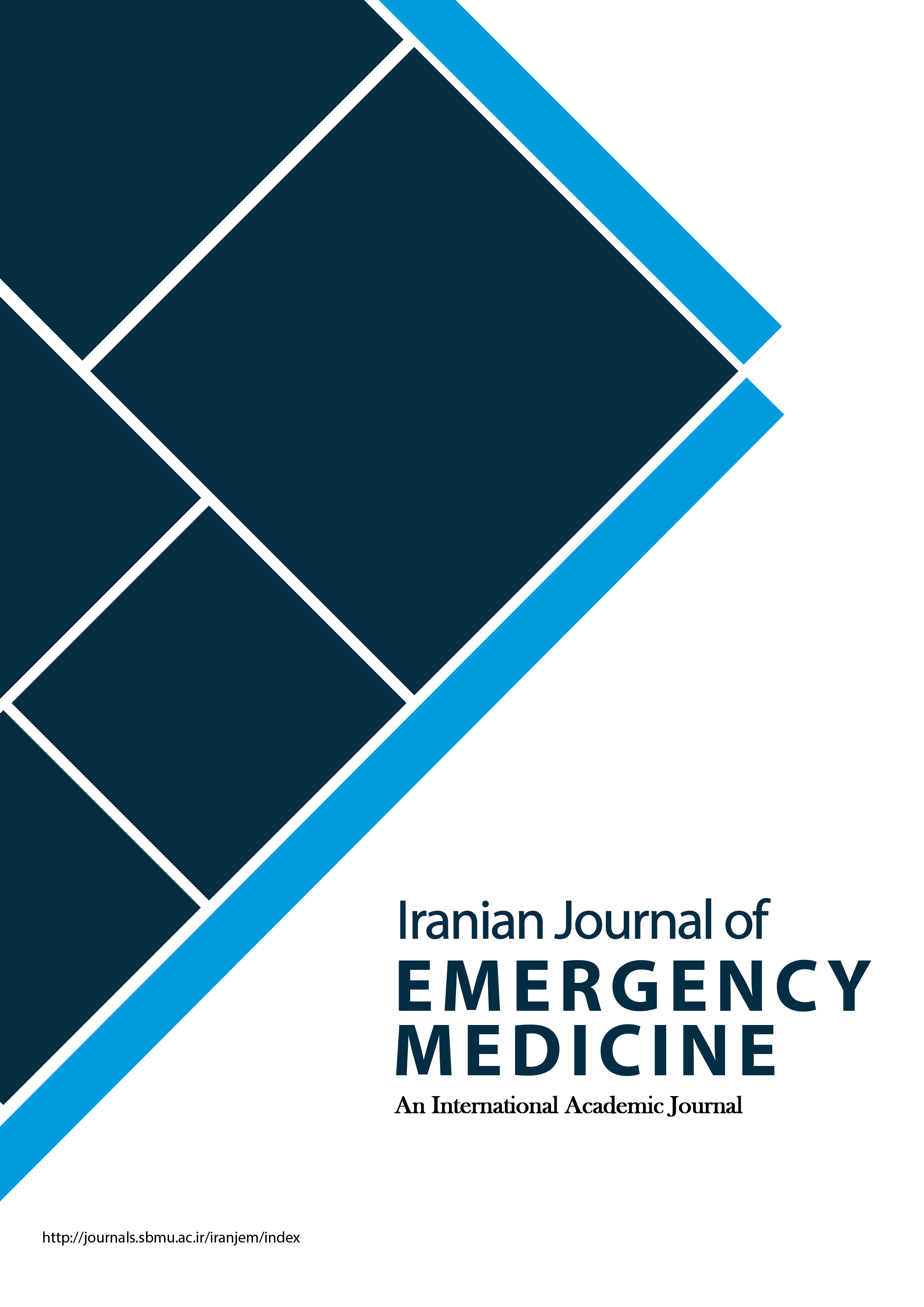Assessing the Predictive Factors of Success in Receiving Clinical Competence at the End of the Residency Program Among Emergency Medicine Residents; a Retrospective Cohort
Iranian Journal of Emergency Medicine,
Vol. 7 No. 1 (2020),
28 March 2020
,
Page e24
https://doi.org/10.22037/ijem.v7i1.26977
Abstract
Introduction: Emergency is one of the most important departments of the hospital and its quality of service is very important. Emergency medicine is a multidisciplinary specialty and interacts with other specialties. Ensuring the scientific and practical efficacy of emergency physicians is of paramount importance. This study examines the factors affecting residents’ academic success. Methods: This historical cohort study was performed aiming to determine the indices predicting success among emergency medicine residents in Tehran University of Medical Sciences in gaining clinical competence by the end of their residency program. Initially, variables were extracted through a literature review and the list was discussed and completed in a session where a number of professors with experience of educational responsibilities were present. 27 criteria were included in the final questionnaire and were scored using a 5-point Likert scale. The questionnaire was sent to 150 graduated residents and response rate was recorded. Residents’ graduation score, which is given on the scale of 150, was considered as the indicator of academic success. Results: A total of 150 emergency medicine graduates were enrolled in the study. Of these, 95 completed the questionnaire. Fifty four were male and 55 were married. 40.35% of the married participants had children and 67.27% of their spouses had a job at the time. 68.42% of the participants lived in Tehran throughout their residency program and 58.95% declared no financial problems. Twenty three had a history of serious artistic activities and 36 had a history of serious sport activities. 5 had finished the program in more than 3 years due to being failed. In the multiple regression analysis, after eliminating confounding factors, being selected as the top resident had the strongest correlation (r=7.88 P=0.001) with their certification exam scores. This was followed by artistic activity (r=4.58 P=0.03), gap between medical school graduation to residency (r=1.53, P=0.004). In addition, age (r=-.96 P=0.046), and university entrance exam rank (r=-0.0027 P=0.002) had reverse correlation with their certification exam scores. Conclusion: The results of this study showed that among the studied indices, being the top resident had the most significant direct correlation with academic success. The study also found that academic success had a significant direct relationship with artistic activities and gap between medical school graduation and residency, and a significant reverse correlation with age followed by university entrance exam rank.
- Emergency Medicine
How to Cite
References
Ericsson A, Pool R. Peak: Secrets from the new science of expertise: Houghton Mifflin Harcourt; 2016.
Duvivier RJ, van Dalen J, Muijtjens AM, Moulaert VR, van der Vleuten CP, Scherpbier AJ. The role of deliberate practice in the acquisition of clinical skills. BMC Medical Education. 2011;11:101.
Moore MJ, Bennett CL. The learning curve for laparoscopic cholecystectomy. The American journal of surgery. 1995;170:55-9.
Counselman FL, Babu K, Edens MA, et al. The 2016 model of the clinical practice of emergency medicine. Journal of Emergency Medicine. 2017;52:846-9.
Considine J, Botti M, Thomas S. Do knowledge and experience have specific roles in triage decision‐making? Academic emergency medicine. 2007;14:722-6.
Wimmers PF, Splinter TA, Hancock GR, Schmidt HG. Clinical competence: General ability or case-specific? Advances in health sciences education. 2007;12:299-314.
Davis DA. How to help professionals maintain and improve their knowledge and skills: Triangulating best practices in medicine. Development of professional expertise: Toward measurement of expert performance and design of optimal learning environments. 2009:180-202.
James PM, Guthrie C, Macleod MR, et al. What's a good doctor and how do you make one? Bmj. 2002;325.
Sobowale K, Ham SA, Curlin FA, Yoon JD. Personality traits are associated with academic achievement in medical school: a nationally representative study. Academic Psychiatry. 2018;42:338-45.
Galazka SS, Kikano GE, Zyzanski S. Methods of recruiting and selecting residents for US family practice residencies. Academic Medicine. 1994;69:304-6.
Crane JT, Ferraro CM. Selection criteria for emergency medicine residency applicants. Academic Emergency Medicine. 2000;7:54-60.
Ullian JA, Bland CJ, Simpson DE. An alternative approach to defining the role of the clinical teacher. Academic medicine: journal of the Association of American Medical Colleges. 1994;69:832-8.
Hayden SR, Hayden M, Gamst A. What characteristics of applicants to emergency medicine residency programs predict future success as an emergency medicine resident? Academic emergency medicine. 2005;12:206-10.
Nazari R, Beheshti Z, Arzani A, HAJI HF, SAAT SS, Bizhani A. Stressor agents in clinical education of nursing students in Amol nursing and midwifery faculty. 2007.
Weiss ST, Rosa RM, Jofe T, Munoz B. A prospective evaluation of performance during the first year of the medical residency. Academic Medicine. 1984;59:967-8.
Boor K, Teunissen PW, Scherpbier AJ, van der Vleuten CP, van de Lande J, Scheele F. Residents’ perceptions of the ideal clinical teacher—a qualitative study. European Journal of Obstetrics & Gynecology and Reproductive Biology. 2008;140:152-7.
Omidi S, Mirfazaelian H, Zebarsast J, Akhgar A, Jalili M. The Construct Validity and Predictive Validity of In-Training Evaluations of Emergency Medicine Residents in Tehran University of Medical Sciences. Iranian Journal of Medical Education. 2019;19:394-402.
Pollard C, Ellis L, Stringer E, Cockayne D. Clinical education: a review of the literature. Nurse Education in Practice. 2007;7:315-22.
- Abstract Viewed: 227 times
- PDF (فارسی) Downloaded: 132 times
- HTML (فارسی) Downloaded: 41 times



